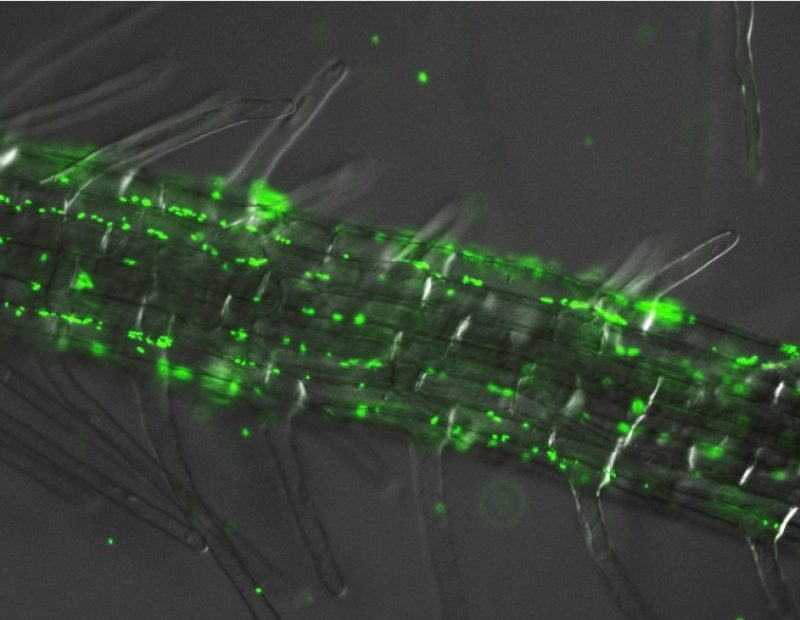Newsroom
Discovery of new genes in root microbiome: harmful or helpful for plants?
Reported by Laleh Solhi from the Brumer Lab, Michael Smith Laboratories
In a study recently published in mBIO, scientists describe the discovery of the plant root microbiome genes responsible for bacterial evasion of the plant immune system. They found that the presence of a model species of rhizosphere bacteria, Pseudomonas fluorescens, can actually improve plant health and fitness. This research was conducted under the direction of Dr. Cara Haney of the Michael Smith Laboratories at the University of British Columbia.

Fluorescent bacteria Pseudomonas fluorescens living on the roots of plant Arabidopsis thaliana
Pseudomonas fluorescens and related plant root-associated species contribute to plant health by controlling defenses and enabling nutrient uptake. First author and Master’s student, Frank (Zhexian) Liu studied how bacterial genes in Pseudomonas fluorescens help evade the immune system of the model plant, Arabidopsis thaliana. Frank and colleagues identified 231 genes in this strain that either positively affected fitness in the rhizosphere of wild-type plants, or negatively affected fitness in the rhizosphere of immunocompromised plants. Out of the 231 genes, Frank focused on two specific genes, morA and spuC, and the role they played in evading the host immune system. This study reveals that the morA gene inhibits biofilm formation and/or promotes dispersal in the rhizosphere. While spuC was also found to inhibit biofilm, the study shows that spuC plays a critical role in the metabolism of a polyamine called putrescine, a small organic molecule. This study showed that putrescine promotes biofilm formation suggesting that putrescine may be a plant-derived signal that can trigger a lifestyle change in bacteria.
Evasion or suppression of the plant immune system is essential for pathogens to successfully infect their plant hosts. The results of this new study is evidence that avoiding plant defenses is critical for survival of commensals in association with a host. Frank and colleagues demonstrated a positive correlation between hyperformation of biofilm and initiation of plant defenses. They concluded that changes in bacterial physiology may be necessary for evasion of plant defenses and survival in association with a eukaryotic host.
Dr. Haney’s lab investigates the genetic factors that regulate assembly of host-associated microbial communities, termed microbiomes. Her lab uses genetic and molecular approaches, combined with high-throughput assays, and next-generation sequencing, to probe the interface of the rhizosphere microbiome with the model plant Arabidopsis.
This work was supported by NSERC Discovery Grant, Canada Foundation for Innovation, and Canada Research Chair grants, Toteston & Fund for Medical Discovery Fellowship, the Gordon and Betty Moore Foundation through Grant to the Life Sciences Research Foundation (LSRF), Simons Foundation Grant to the LSRF, and NSERC URSA.
The research publication is available in mBio.